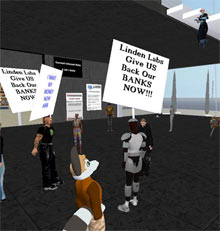Second Life Closes Banks
For months, as banking meltdowns in the virtual world Second Life cost participants steep losses of real money, corporate owner Linden Lab of San Francisco stuck to a laissez-faire line, essentially saying, We just host the software; residents should avoid deals that sound too good to be true. But this week, Linden Lab abruptly banned virtual banks that can’t furnish “proof of an applicable government registration statement or financial institution charter.” The requirement appears likely to shut down all of Second Life’s banks.

“There is no workable alternative,” Linden Lab wrote in an announcement posted Tuesday. “The so-called banks are not operated, overseen or insured by Linden Lab, nor can we predict which will fail or when. And Linden Lab isn’t, and can’t start acting as, a banking regulator.” The company wrote that “these ‘banks’ have brought unique and substantial risks to Second Life, and we feel it’s our duty to step in. Offering unsustainably high interest rates, they are in most cases doomed to collapse–leaving upset ‘depositors’ with nothing to show for their investments. As these activities grow, they become more likely to lead to destabilization of the virtual economy.”
A Linden Lab spokesman said that the company was not offering further interviews or comment on the decision or its timing.
The about-face came six days after Technology Review posted a story that described avatar losses and cited the possibility that one virtual-bank meltdown may have produced aggregate losses of some $700,000 in real money to many hundreds of Second Life “residents” in a manner that would be illegal in the real world. (See “The Fleecing of the Avatars.”) “I think the timing may well have been due to [that] story,” says Ben Duranske, an Idaho lawyer who has been closely following the complaints of Second Life participants.
Last year, some Second Life residents–subscribers whose digital alter egos, or avatars, populate the virtual world–deposited their virtual money, called Linden dollars, into a “bank” called Ginko Financial that had popped up in-world, promising high interest rates. Last summer, Ginko restricted withdrawals and eventually vanished. Since Linden dollars can be exchanged for real U.S. dollars, the losses were painfully real. (See “Money Troubles in Second Life.”) It is not clear who was behind the Ginko operation.
Duranske yesterday posted this blog entry praising the bank ban as a “positive step that will save a lot of people a lot of unhappiness in the long run.” The policy, which pertains to in-world companies that offer transfers of Linden dollars and payment of interest, takes effect January 22.
Robert Bloomfield, a Cornell University economist and virtual-world watcher who had argued that self-regulation deserved a chance to fix Second Life’s financial problems, says he believes that banks will face runs and be unable to pay depositors, triggering new losses. (See “Second Chance for Second Life.”) But he says that the larger Second Life economy, which by one recent measure has more than 300,000 participants, would not be profoundly affected because people will still be able to make, buy, and sell digital goods and exchange virtual and real dollars.
Yesterday, within Second Life, depositors appeared to rush to withdraw money from remaining banks, such as Midas Bank and BCX Bank, and some waved signs saying, “Linden Lab: Give Us Back Our Banks Now!” By one account, avatars of bank owners gamely stood guard outside their virtual institutions. “In a half-dozen of the largest banks, I saw the owners, CEOs, and chief financial officers all standing in the foyers, putting up notices and attempting to reassure their depositors. The bling! The prim hair! One man even wore white gloves,” wrote Prokofy Neva (whose real name is Catherine Fitzpatrick) in her blog.
Bloomfield is hosting a forum on the matter in Second Life today at 2:00 p.m.; the forum can be found here. One open question, Bloomfield says, is whether the ban would pertain not just to banks but to stock-market exchanges that have also popped up in Second Life. Linden Lab declined to participate in the forum, Bloomfield says.
Keep Reading
Most Popular
Large language models can do jaw-dropping things. But nobody knows exactly why.
And that's a problem. Figuring it out is one of the biggest scientific puzzles of our time and a crucial step towards controlling more powerful future models.
The problem with plug-in hybrids? Their drivers.
Plug-in hybrids are often sold as a transition to EVs, but new data from Europe shows we’re still underestimating the emissions they produce.
Google DeepMind’s new generative model makes Super Mario–like games from scratch
Genie learns how to control games by watching hours and hours of video. It could help train next-gen robots too.
How scientists traced a mysterious covid case back to six toilets
When wastewater surveillance turns into a hunt for a single infected individual, the ethics get tricky.
Stay connected
Get the latest updates from
MIT Technology Review
Discover special offers, top stories, upcoming events, and more.